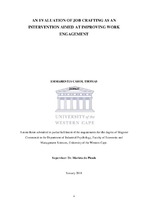| dc.contributor.advisor | du Plessis, Marieta | |
| dc.contributor.author | Thomas, Emmarentia Carol | |
| dc.date.accessioned | 2018-10-04T10:28:49Z | |
| dc.date.available | 2018-12-31T22:10:06Z | |
| dc.date.issued | 2018 | |
| dc.identifier.uri | http://hdl.handle.net/11394/6452 | |
| dc.description | Magister Commercii (Industrial Psychology) - MCom (IPS) | |
| dc.description.abstract | The construction industry plays a crucial role in the South African economy. In this high-risk industry, a lack of engagement by employees can have serious and costly health and safety consequences. Because construction companies work under conditions of tight deadlines and stringent requirements, executives and managers are often unable to reduce the demands on their employees. Hence, if employees are to increase their own levels of work engagement (and so improve health, promote safety, and guard against burnout), they need to exert personal agency by recrafting their own jobs.
The term job crafting refers to proactive employee behaviours that seek to optimise the work environment, frequently by addressing the balance between job demands and job resource. Previous literature suggests that employees who use job crafting behaviours show higher work engagement, lower disengagement, more positive emotions, and better adaptive performance. | |
| dc.language.iso | en | |
| dc.publisher | University of the Western Cape | |
| dc.subject | Employee engagement, JD-R theory, Job crafting, Job crafting intervention, Job demands, Job resources, Personal resources, Proactive behaviour, Quasi-experimental study, Work engagement | |
| dc.title | An evaluation of job crafting as an intervention aimed at improving work engagement | |
| dc.rights.holder | University of the Western Cape | |

